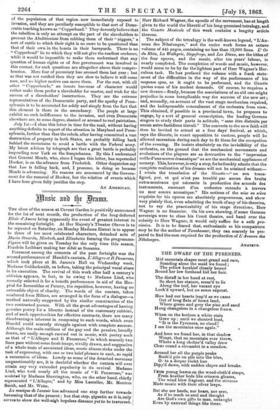Dusk an tly girannt.
The close of the season at Covent Garden is positively announced for the 1st of next month, the production of the long-deferred Elisir d'Amore being apparently the event of greatest interest in the remaining fortnight. At Her Majesty's Theatre Oberon is to be repeated on Saturday, on Monday Madame Ristori is to appear in three of her most celebrated characters, detached acts of Maria Stuarda, Macbeth, and Elizabetta forming the programme. Figaro will be given on Tuesday for the only time this season, Fraulein Leibhart making her deb& as Susanna.
Foremost among the concerts of the past fortnight was the second performance of Handel's cantata, L' Allegro et 11 Penseroso, which took place at St. James's Hall on Wednesday week, Madame Goldschmidt, as before, taking the principal vocal share in its execution. The revival of this work after half a century's oblivion appears, in fact, to be owing to Madame Lind, who recently selected it for a benefit performance in aid of the Hos- pital for Incurables at Putney, the repetition, however, having no ostensible object of charity. The words of the cantata, taken unaltered from Milton, are arranged in the form of a dialogue—a method naturally suggested by the similar construction of the two contrasted poems. With all the great advantages of having genuine poetry for a libretto instead of the customary rubbish, and of such opportunities for effective contrasts, there are many disadvantages inherent in composing to such words, which even Handel could scarcely struggle against with complete success. Although the main outlines of the gay and the pensive, broadly drawn, are easily enough carried out in music, with poetry such as that of " L'Allegro and 11 Penseroso," in which scarcely two lines pass without some fresh image, vividly drawn, and suggestive of a whole train of associated ideas, music almost sinks under the task of expressing, with one or two brief phrases to each, so rapid a succession of ideas. Lovely as some of the detached morceaux unquestionably are, it is doubtful whether the cantata will ever attain any very extended popularity in its revival. Madame Lind, who took nearly all the music of "II Penseroso," was assisted by Madame Sherrington, who, on the other hand, chiefly represented " L'Allegro," and by Miss Lascelles, Mr. Mont= Smith, and Mr. Weiss.
La mutrigue de ravenir has advanced one step further towards becoming that of the present ; but that step, gigantic as it is,only serves to show the well-nigh hopeless distance yet to be traversed. Herr Richard Wagner, the apostle of the movement, has at length given to the world the libretti of his long-promised tetralogy, and the Gazette Musicale of this week contains a lengthy article thereon.
The subject of the tetralogy is the well-known legend, "L'An- neau des Nibelungen," and the entire work forms an octavo volume of 445 pages, containing no less than 12,000 lines. L' Or du Rhin, La Walkyrie, Siegefroye, and Les Dieux, are the titles of the four operas, and the music, after ten years' labour, is nearly completed. The completion of words and music, however, would seem to be by far the lightest part of Herr Wagner's Her- culean task. He has prefaced the volume with a frank state- ment of the difficulties in the way of the performance of his magnum opus, as it ought to be performed, and the Gazette quotes some of his modest demands. Of course, he requires a new theatre—firstly, because the associations of an old one might prejudice in some inexplicable way the success of the new art ; and, secondly, on account of the vast stage mechanism required, and the indispensable concealment of the orchestra from view. This obtained, if possible in a provincial town, he proposes to engage, by a sort of general conscription, the leading German singers to study their parts in solitude, "sans etre distraits par aucun autre fastidieux travail." The converts to the new faith will then be invited to attend at a four days festival, at which, says the Gazette, in exact opposition to custom, people will be allowed recreation during each day to fit them for the occupation of the evening. He insists absolutely on the invisibility of the orchestra, on the ground that the mechanical movements and evolutions of the players are as destructive to the "impression reelle d'uneceuvre dramatiquo" as are the mechanical appliances of scenery. This,however,is only a step, forhe frankly admits that the complete realization of his dreams will not be attained without— I retain the translation of the Gazette—" un son trans- figure, pur, et qui n'est pas trouble par aucun des bruits extra-musicaux qui necessite la production des accords des instruments, emanant d'un orchestre entendu h travers un mur sonore acoustique." His notions of the miss en scene requisite for his operas are absolutely preposterous, and show very plainly that, even admitting the truth of any of his theories, not to say the practicability of his stage directions, Herr Wagner is no financier. On his own showing, if some German sovereign were to close his Court theatre, and hand over the subsidy to Herr Wagner, it would only suffice for a sane pro- visoire. It is to be feared that, enthusiastic as his compatriots may be for the author of Tannha user, they can scarcely be pre- pared to find the sum required for the production of L' einneau des Nibelungen.
AMATEUR-






























 Previous page
Previous page